Schmitt C.B. (ed.) The Cambridge History of Renaissance Philosophy
Подождите немного. Документ загружается.

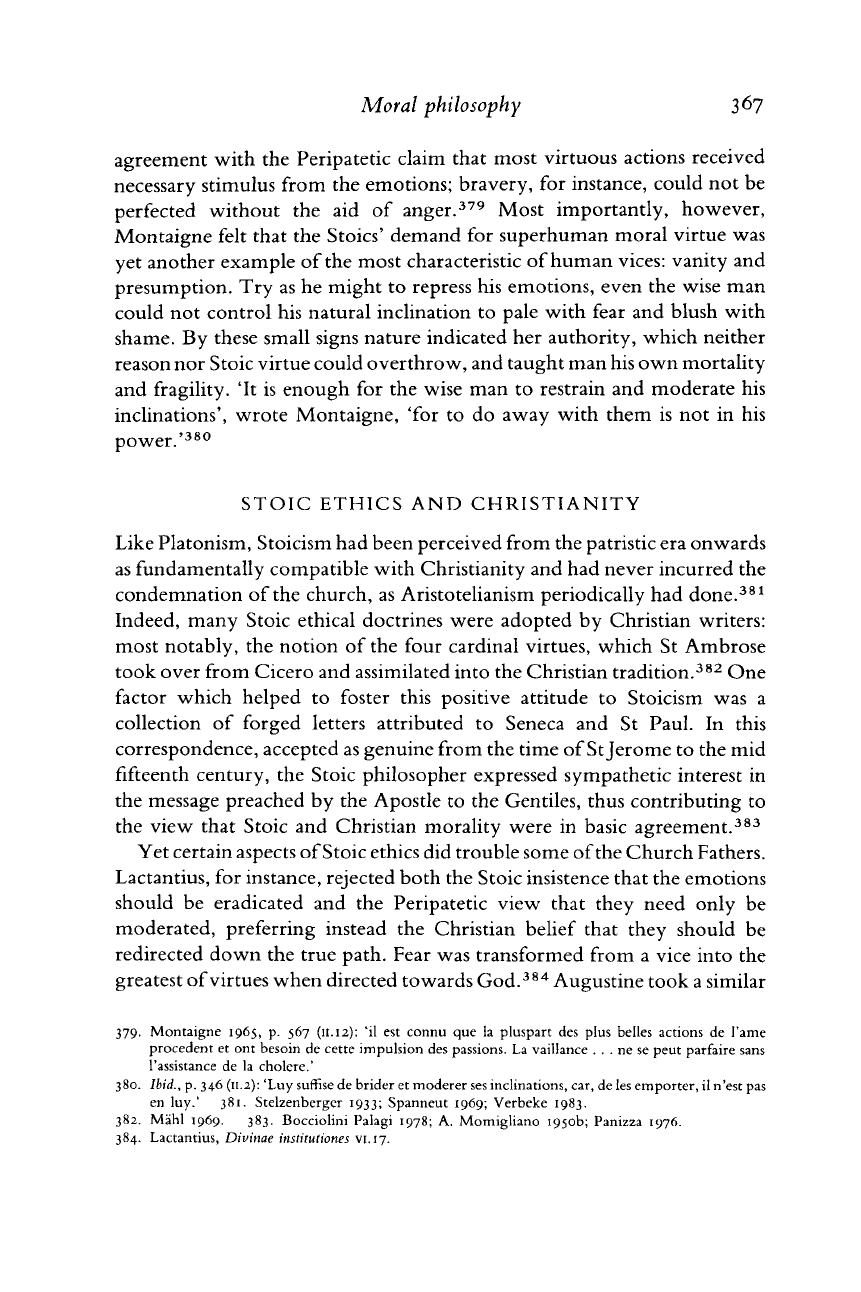
Moral philosophy
agreement with the Peripatetic claim
that
most virtuous actions received
necessary stimulus from the emotions; bravery, for instance, could not be
perfected without the aid of anger.
379
Most importantly, however,
Montaigne felt
that
the
Stoics'
demand for superhuman moral virtue was
yet
another
example of the most characteristic of human
vices:
vanity and
presumption. Try as he might to repress his emotions, even the wise man
could
not control his
natural
inclination to pale with fear and blush with
shame. By these small signs
nature
indicated her authority, which neither
reason nor Stoic virtue could overthrow, and taught man his own mortality
and fragility. 'It is enough for the wise man to
restrain
and moderate his
inclinations', wrote Montaigne, 'for to do away with them is not in his
power.'
380
STOIC
ETHICS
AND
CHRISTIANITY
Like
Platonism, Stoicism had been perceived from the patristic era onwards
as fundamentally compatible with Christianity and had never incurred the
condemnation of the church, as Aristotelianism periodically had done.
381
Indeed, many Stoic ethical doctrines were adopted by Christian writers:
most notably, the notion of the four cardinal virtues, which St Ambrose
took
over from
Cicero
and assimilated into the Christian tradition.
382
One
factor
which helped to foster this positive
attitude
to Stoicism was a
collection
of forged letters
attributed
to Seneca and St Paul. In this
correspondence, accepted as genuine from the time
of
St
Jerome
to the mid
fifteenth century, the Stoic philosopher expressed sympathetic interest in
the message preached by the Apostle to the Gentiles,
thus
contributing to
the
view
that
Stoic and Christian morality were in basic agreement.
383
Yet
certain aspects
of
Stoic
ethics did trouble some
of
the Church Fathers.
Lactantius, for instance, rejected both the Stoic insistence
that
the emotions
should be eradicated and the Peripatetic
view
that
they need only be
moderated, preferring instead the Christian
belief
that
they should be
redirected down the
true
path.
Fear was transformed from a
vice
into the
greatest
of
virtues when directed towards God.
384
Augustine took a similar
379.
Montaigne
1965, p. 567 (11.12): 'il est
connu
que la
pluspart
des
plus
belles
actions
de
Fame
procèdent
et ont
besoin
de
cette
impulsion
des
passions.
La
vaillance
... ne se
peut
parfaire
sans
l'assistance
de la
cholere.'
380. Ibid., p. 346 (11.2): 'Luy
suffise
de
brider
et
modérer
ses
inclinations,
car, de les
emporter,
il
n'est
pas
en luy.' 381.
Stelzenberger
1933;
Spanneut
1969;
Verbeke
1983.
382.
Màhl
1969. 383.
Bocciolini
Palagi
1978; A.
Momigliano
1950b;
Panizza
1976.
384.
Lactantius,
Divinae institutiones vi.17.
Cambridge Histories Online © Cambridge University Press, 2008
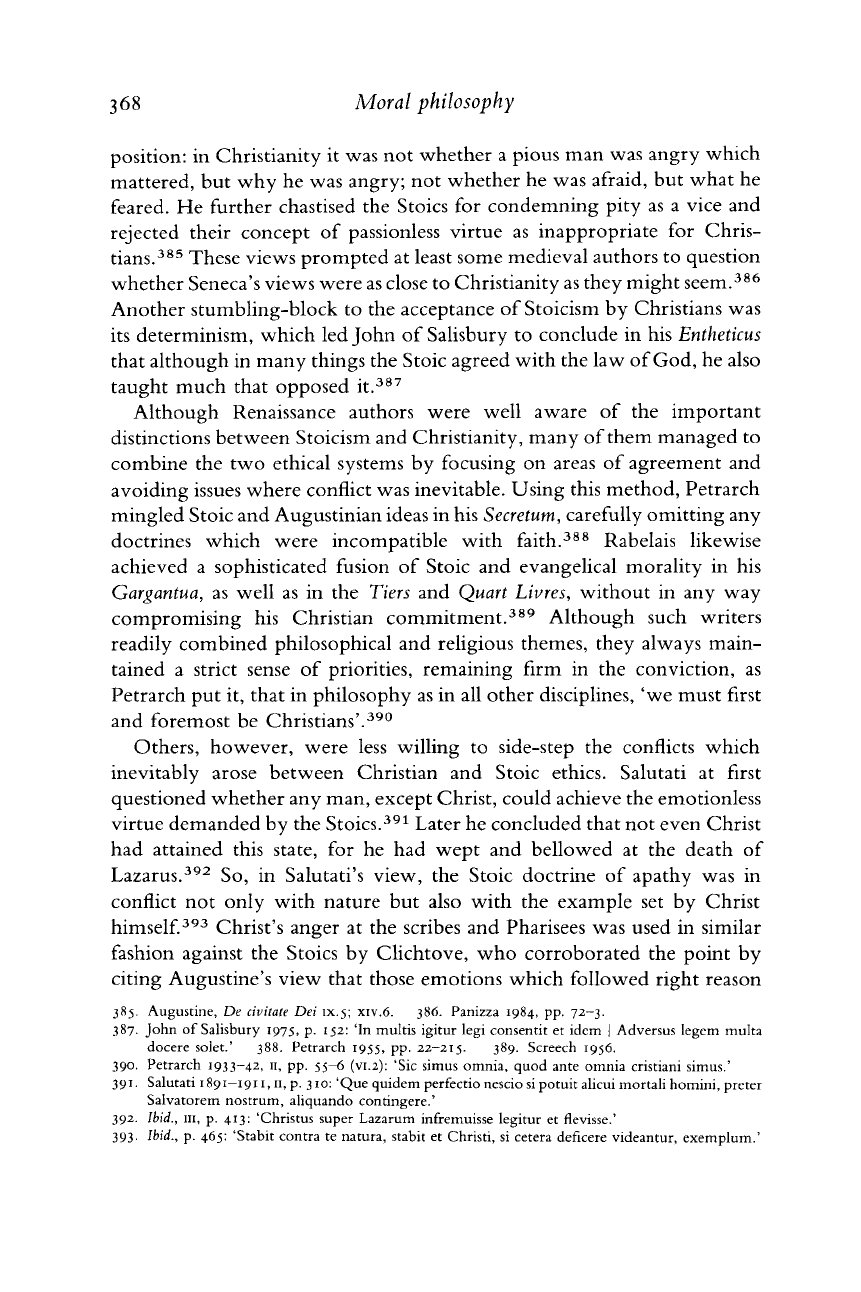
368
Moral philosophy
position:
in
Christianity
it was not
whether
a
pious
man was
angry which
mattered,
but why he was
angry;
not
whether
he was
afraid,
but
what
he
feared.
He
further chastised
the
Stoics
for
condemning pity
as a
vice
and
rejected their concept
of
passionless virtue
as
inappropriate
for
Chris-
tians.
385
These
views
prompted
at
least some medieval
authors
to
question
whether Seneca's
views
were
as
close
to
Christianity
as
they might seem.
386
Another stumbling-block
to the
acceptance
of
Stoicism
by
Christians
was
its determinism, which
led
John
of
Salisbury
to
conclude
in his
Entheticus
that
although
in
many things
the
Stoic agreed with
the law
of
God,
he
also
taught much
that
opposed it.
387
Although
Renaissance
authors
were
well
aware
of the
important
distinctions between Stoicism
and
Christianity, many
of
them managed
to
combine
the two
ethical systems
by
focusing
on
areas
of
agreement
and
avoiding
issues where conflict was inevitable. Using this method, Petrarch
mingled Stoic
and
Augustinian ideas
in his
Secretum, carefully omitting
any
doctrines which were incompatible with faith.
388
Rabelais likewise
achieved
a
sophisticated fusion
of
Stoic
and
evangelical morality
in his
Gargantua,
as
well
as in the
Tiers
and
Quart Livres, without
in any way
compromising
his
Christian commitment.
389
Although such writers
readily combined philosophical
and
religious themes, they always main-
tained
a
strict sense
of
priorities, remaining firm
in the
conviction,
as
Petrarch
put it,
that
in
philosophy
as in all
other disciplines,
'we
must first
and foremost
be
Christians'.
390
Others, however, were less
willing
to
side-step
the
conflicts which
inevitably
arose between Christian
and
Stoic ethics. Salutati
at
first
questioned whether
any man,
except Christ, could achieve
the
emotionless
virtue demanded
by the
Stoics.
391
Later
he
concluded
that
not
even Christ
had attained this state,
for he had
wept
and
bellowed
at the
death
of
Lazarus.
392
So, in
Salutati's
view,
the
Stoic doctrine
of
apathy
was in
conflict
not
only with
nature
but
also with
the
example
set by
Christ
himself.
393
Christ's anger
at the
scribes
and
Pharisees
was
used
in
similar
fashion against
the
Stoics
by
Clichtove,
who
corroborated
the
point
by
citing
Augustine's
view
that
those emotions which
followed
right reason
385. Augustine, De
civitate
Dei ix.5; xiv.6. 386. Panizza 1984, pp. 72-3.
387. John of Salisbury 1975, p. 152: 'In multis igitur legi consentit et idem | Adversus legem multa
docere
solet.'
388. Petrarch 1955, pp.
22-215.
Screech 1956.
390. Petrarch 1933-42, 11, pp. 55-6 (vi.2): 'Sic
simus
omnia, quod ante omnia cristiani simus.'
391.
Salutati
1891-1911,11,
p. 310: 'Que quidem perfectio
nescio
si potuit alicui mortali homini, prefer
Salvatorem
nostrum, aliquando contingere.'
392.
Ibid.,
m, p. 413: 'Christus super Lazarum infremuisse legitur et flevisse.'
393.
Ibid.,
p. 465: 'Stabit contra te natura, stabit et Christi, si cetera deficere videantur, exemplum.'
Cambridge Histories Online © Cambridge University Press, 2008
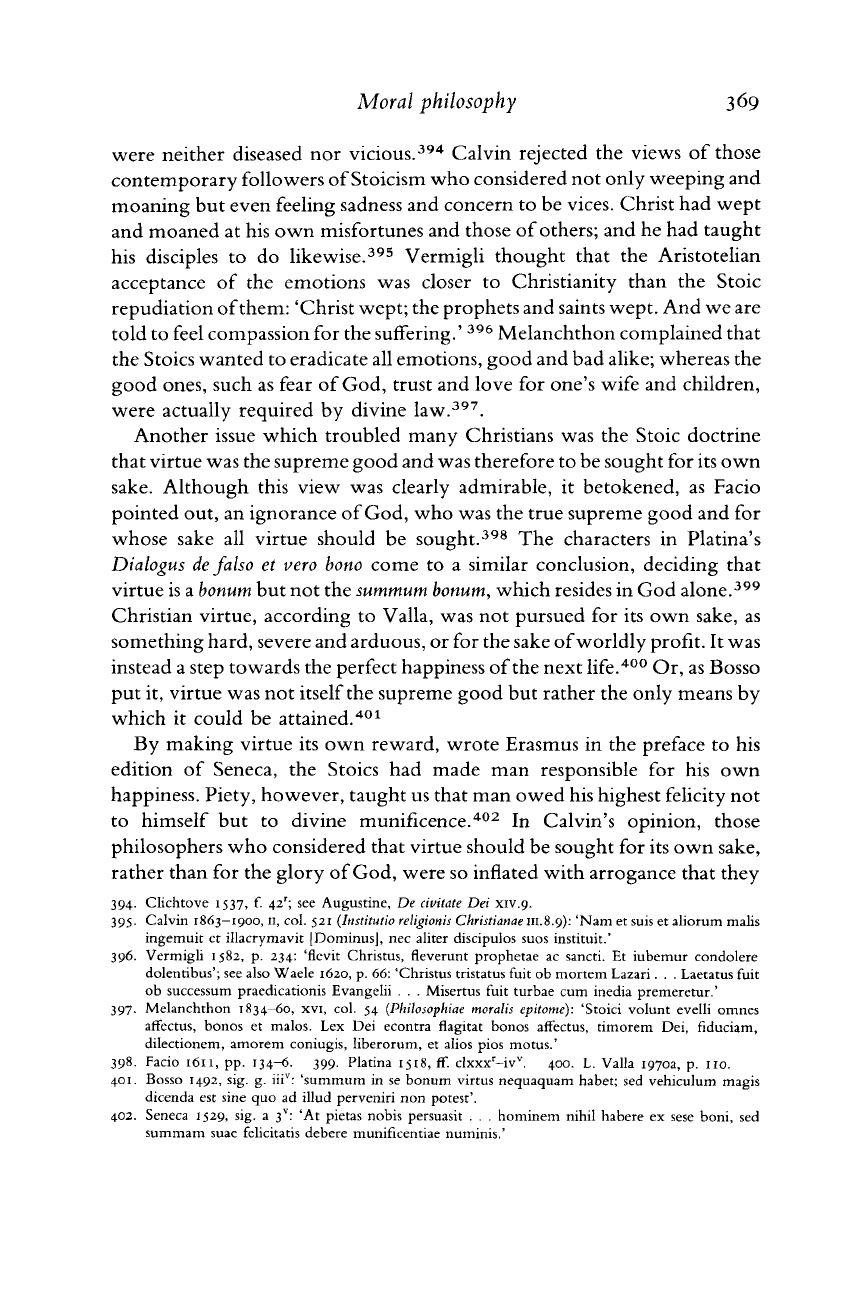
Moral philosophy
were
neither diseased
nor
vicious.
394
Calvin
rejected
the
views
of
those
contemporary followers
of
Stoicism
who
considered
not
only weeping
and
moaning
but
even feeling sadness
and
concern
to be
vices.
Christ
had
wept
and moaned
at his own
misfortunes
and
those
of
others;
and he had
taught
his disciples
to do
likewise.
395
Vermigli thought
that the
Aristotelian
acceptance
of the
emotions
was
closer
to
Christianity than
the
Stoic
repudiation
of
them: 'Christ wept;
the
prophets
and
saints wept. And
we are
told
to
feel
compassion
for the
suffering.'
396
Melanchthon complained
that
the Stoics wanted
to
eradicate all emotions, good
and bad
alike; whereas
the
good
ones, such
as
fear
of
God,
trust and
love
for
one's
wife
and
children,
were
actually required
by
divine law.
397
.
Another
issue which troubled many Christians
was the
Stoic doctrine
that
virtue was
the
supreme good
and
was therefore
to be
sought
for
its
own
sake.
Although this
view
was
clearly admirable,
it
betokened,
as
Facio
pointed
out, an
ignorance
of
God,
who was the true
supreme good
and for
whose
sake
all
virtue should
be
sought.
398
The
characters
in
Platina's
Dialogus
de falso
et
vero bono come
to a
similar conclusion, deciding
that
virtue
is a
bonum
but not the summum
bonum, which resides
in
God alone.
399
Christian virtue, according
to
Valla,
was not
pursued
for its own
sake,
as
something hard, severe
and
arduous,
or for the
sake
of
worldly
profit.
It
was
instead
a
step towards
the
perfect happiness
of
the next
life.
400
Or, as
Bosso
put
it,
virtue was
not
itself
the
supreme good
but
rather
the
only means
by
which
it
could
be
attained.
401
By
making virtue
its own
reward, wrote Erasmus
in the
preface
to his
edition
of
Seneca,
the
Stoics
had
made
man
responsible
for his own
happiness. Piety, however, taught
us that man
owed
his
highest felicity
not
to himself
but to
divine munificence.
402
In
Calvin's opinion, those
philosophers
who
considered
that
virtue should
be
sought
for its own
sake,
rather than
for the
glory
of
God, were
so
inflated with arrogance
that
they
394. Clichtove 1537, f. 42
1
"; see Augustine, De
civitate
Dei xiv.9.
395.
Calvin
1863-1900,11, col. 521
(Institutio religionis Christianae
in.8.9):
'Nam et
suis
et aliorum malis
ingemuit et illacrymavit [Dominus], nec aliter discipulos
suos
instituit.'
396. Vermigli 1582, p. 234: 'flevit Christus, fleverunt prophetae ac sancti. Et iubemur condolere
dolentibus'; see also Waele 1620, p. 66: 'Christus tristatus fuit ob mortem
Lazari.
. . Laetatus fuit
ob successum praedicationis Evangelii . . . Misertus fuit turbae cum inedia premeretur.'
397. Melanchthon 1834-60, xvi, col. 54
(Philosophiae moralis epitome):
'Stoici volunt evelli omnes
affectus,
bonos et malos. Lex Dei econtra flagitat bonos affectus, timorem Dei, fiduciam,
dilectionem, amorem coniugis, liberorum, et alios pios motus.'
398. Facio 1611, pp. 134-6. 399. Platina 1518, ff. clxxx
r
-iv
v
. 400. L. Valla 1970a, p. 110.
401.
Bosso 1492, sig. g. iii
v
: 'summum in se bonum virtus nequaquam habet; sed vehiculum magis
dicenda est
sine
quo ad illud perveniri non potest'.
402. Seneca 1529, sig. a 3
V
: 'At pietas nobis persuasit . . . hominem nihil habere ex
sese
boni, sed
summam suae felicitatis debere munificentiae numinis.'
Cambridge Histories Online © Cambridge University Press, 2008
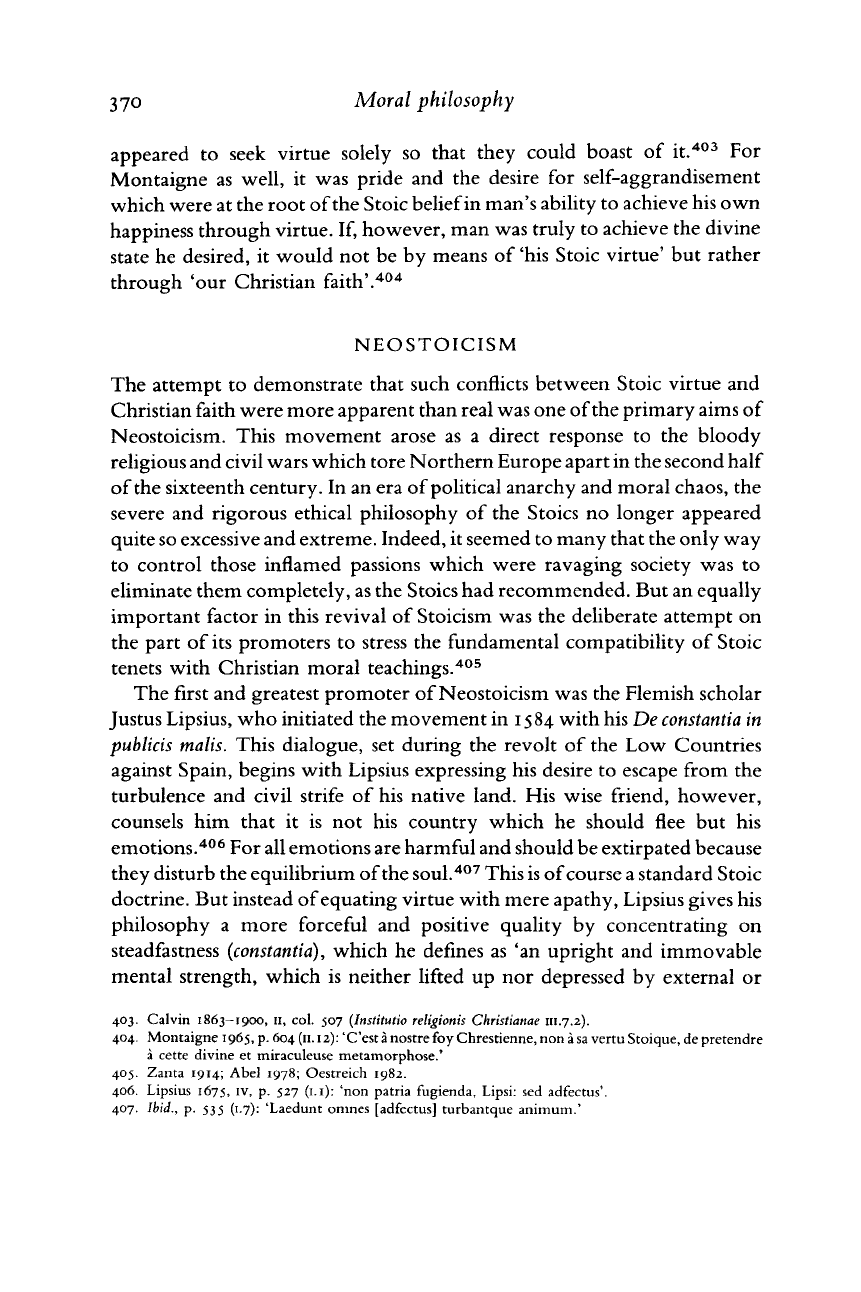
370
Moral philosophy
appeared to seek virtue solely so
that
they could boast of it.
403
For
Montaigne as
well,
it was pride and the desire for self-aggrandisement
which
were at the root
of
the Stoic
belief
in man's ability to achieve his own
happiness through virtue. If, however, man was truly to achieve the divine
state he desired, it would not be by means of 'his Stoic virtue' but
rather
through 'our Christian faith'.
404
NEOSTOICISM
The
attempt to demonstrate
that
such conflicts between Stoic virtue and
Christian faith were more apparent
than
real was one
of
the primary aims of
Neostoicism.
This movement arose as a direct response to the bloody
religious
and
civil
wars which tore Northern Europe
apart
in the second half
of
the sixteenth century. In an era
of
political
anarchy and moral chaos, the
severe
and rigorous ethical philosophy of the Stoics no longer appeared
quite so
excessive
and extreme. Indeed, it seemed to many
that
the only way
to control those inflamed passions which were ravaging society was to
eliminate them completely, as the Stoics had recommended. But an equally
important factor in this revival of Stoicism was the deliberate attempt on
the
part
of its promoters to stress the fundamental compatibility of Stoic
tenets with Christian moral teachings.
405
The
first and greatest promoter of Neostoicism was the Flemish scholar
Justus
Lipsius, who initiated the movement in 1584 with his De constantia in
publicis
malis. This dialogue, set during the revolt of the Low Countries
against Spain, begins with Lipsius expressing his desire to escape from the
turbulence and
civil
strife of his native land. His wise friend, however,
counsels
him
that
it is not his country which he should
flee
but his
emotions.
406
For all emotions are harmful and should be extirpated because
they disturb the equilibrium
of
the soul.
407
This is
of
course a standard Stoic
doctrine. But instead
of
equating virtue with mere apathy, Lipsius
gives
his
philosophy a more forceful and positive quality by concentrating on
steadfastness (constantia), which he defines as 'an upright and immovable
mental strength, which is neither lifted up nor depressed by external or
403.
Calvin
1863-1900,
11, col. 507
(Institutio
religionis Christianae 111.7.2).
404.
Montaigne
1965, p. 604 (11.12):
'C'est
a
nostre
foy
Chrestienne,
non a sa
vertu
Stoique,
de
pretendre
a
cette
divine
et
miraculeuse
metamorphose.'
405.
Zanta
1914;
Abel
1978;
Oestreich
1982.
406.
Lipsius
1675, iv, p. 527 (1.1): 'non
patria
fugienda,
Lipsi:
sed
adfectus'.
407. Ibid., p. 535 (1.7):
'Laedunt
omnes
[adfectus]
turbantque
animum.'
Cambridge Histories Online © Cambridge University Press, 2008
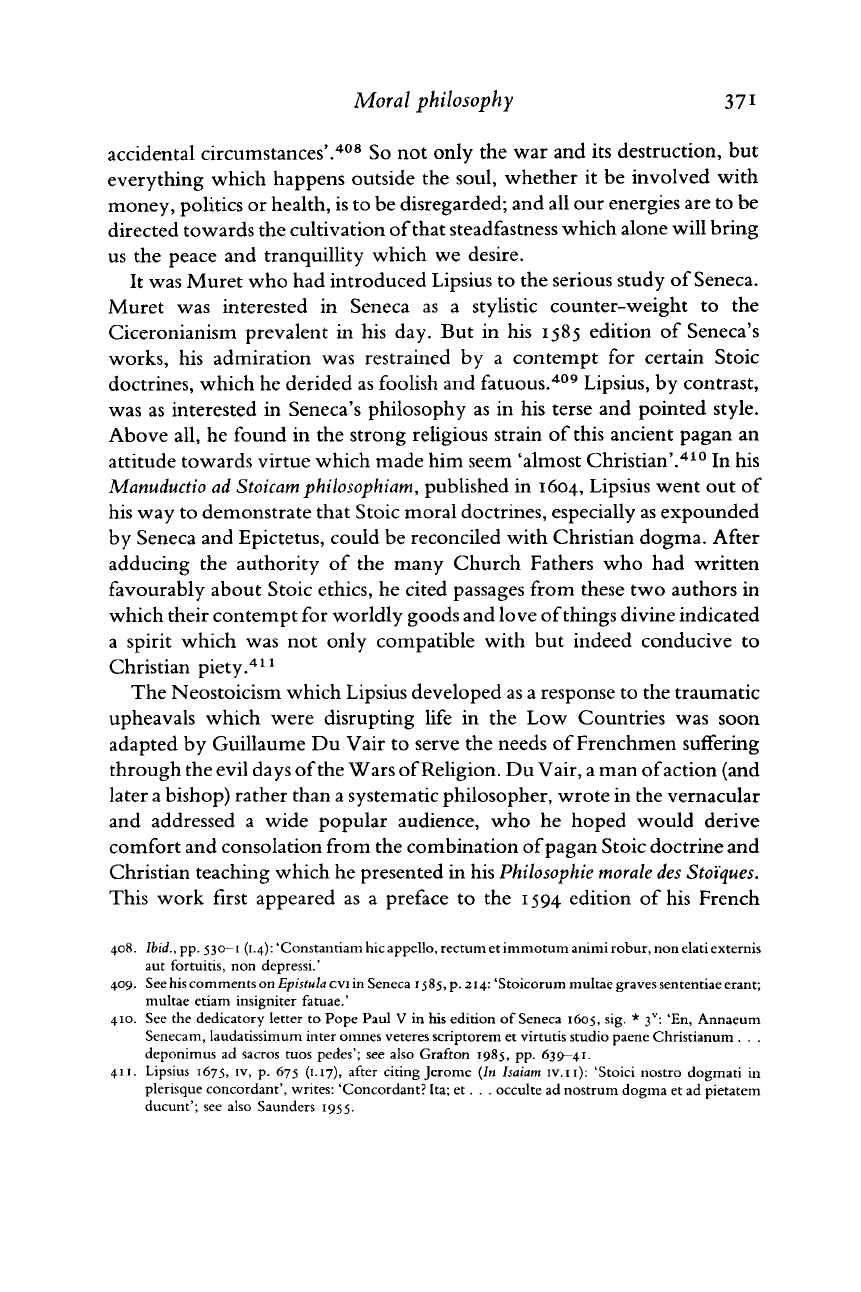
Moral philosophy
37i
accidental circumstances'.
408
So not
only
the war and its
destruction,
but
everything which happens outside
the
soul, whether
it be
involved with
money, politics
or
health,
is to be
disregarded;
and all our
energies
are to be
directed towards
the
cultivation
of
that
steadfastness which alone
will
bring
us
the
peace
and
tranquillity which
we
desire.
It
was
Muret
who had
introduced Lipsius
to the
serious study
of
Seneca.
Muret
was
interested
in
Seneca
as a
stylistic counter-weight
to the
Ciceronianism prevalent
in his day. But in his 1585
edition
of
Seneca's
works,
his
admiration
was
restrained
by a
contempt
for
certain Stoic
doctrines, which
he
derided
as
foolish
and
fatuous.
409
Lipsius,
by
contrast,
was
as
interested
in
Seneca's philosophy
as in his
terse
and
pointed style.
Above
all, he
found
in the
strong religious
strain
of
this ancient pagan
an
attitude
towards virtue which made
him
seem 'almost Christian'.
410
In his
Manuductio
ad
Stoicam philosophiam, published
in
1604, Lipsius went
out of
his way
to
demonstrate
that
Stoic moral doctrines, especially
as
expounded
by
Seneca
and
Epictetus, could
be
reconciled with Christian dogma. After
adducing
the
authority
of the
many Church Fathers
who had
written
favourably
about Stoic ethics,
he
cited passages from these
two
authors
in
which
their contempt
for
worldly goods
and
love
of
things divine indicated
a spirit which
was not
only compatible with
but
indeed conducive
to
Christian piety.
411
The
Neostoicism which Lipsius developed
as a
response
to the
traumatic
upheavals which were disrupting
life
in the Low
Countries
was
soon
adapted
by
Guillaume
Du
Vair
to
serve
the
needs
of
Frenchmen suffering
through
the
evil
days
of
the Wars
of
Religion.
Du
Vair,
a man
of
action
(and
later
a
bishop)
rather
than
a
systematic philosopher, wrote
in the
vernacular
and addressed
a
wide popular audience,
who he
hoped would derive
comfort
and
consolation from
the
combination
of
pagan Stoic doctrine
and
Christian teaching which
he
presented
in his
Philosophic morale
des
Stoiques.
This
work first appeared
as a
preface
to the 1594
edition
of his
French
408.
Ibid.,
pp. 530-1 (1.4): 'Constantiam hieappello, rectum et immotumanimi robur, nonelatiexternis
aut
fortuitis, non depressi.'
409. See his comments on
Epistula
evi in Seneca 1585, p. 214: 'Stoicorum multae graves sententiae erant;
multae etiam insigniter fatuae.'
410.
See the dedicatory letter to Pope Paul V in his edition of Seneca 1605, sig. * 3
V
: 'En, Annaeum
Senecam, laudatissimum inter omnes veteres scriptorem et virtutis studio paene Christianum . . .
deponimus ad sacros tuos pedes'; see also Grafton 1985, pp. 639-41.
411.
Lipsius 1675, iv, p. 675
(1.17),
after citing Jerome (In Isaiam iv.n): 'Stoici nostro dogmati in
plerisque concordant', writes: 'Concordant? Ita; et. . . occulte ad nostrum dogma et ad pietatem
ducunt';
see also Saunders 1955.
Cambridge Histories Online © Cambridge University Press, 2008
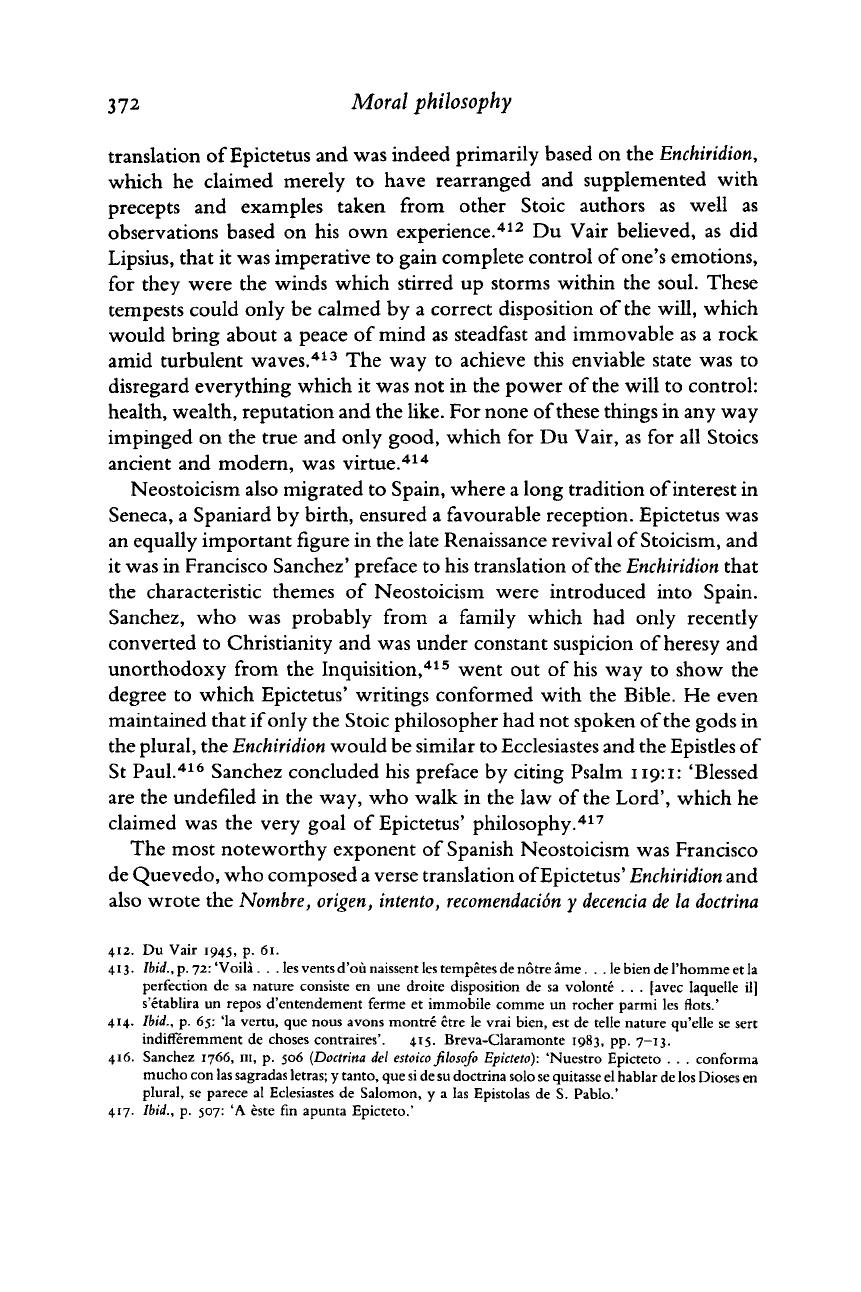
372
Moral philosophy
translation of
Epictetus
and was indeed primarily based on the
Enchiridion,
which he claimed merely to have rearranged and supplemented with
precepts and examples taken from other Stoic authors as well as
observations based on his own experience.
412
Du
Vair
believed, as did
Lipsius,
that it was imperative to gain complete control of
one's
emotions,
for they were the winds which stirred up storms within the soul. These
tempests could only be calmed by a correct disposition of the will, which
would bring about a peace of mind as steadfast and immovable as a rock
amid turbulent waves.
413
The way to achieve this enviable state was to
disregard everything which it was not in the power of the will to control:
health, wealth, reputation and the like. For
none
of
these
things in any way
impinged on the true and only good, which for Du
Vair,
as for all Stoics
ancient and modern, was virtue.
414
Neostoicism also migrated to Spain, where a long tradition of interest in
Seneca, a Spaniard by birth, ensured a favourable reception. Epictetus was
an equally important figure in the late Renaissance revival of Stoicism, and
it was in Francisco Sanchez' preface to his translation of the
Enchiridion
that
the characteristic themes of Neostoicism were introduced into Spain.
Sanchez,
who was probably from a family which had only recently
converted to Christianity and was under constant suspicion of heresy and
unorthodoxy from the Inquisition,
415
went out of his way to show the
degree to which Epictetus' writings conformed with the Bible. He even
maintained that if only the Stoic philosopher had not spoken of the gods in
the plural, the
Enchiridion
would be similar to Ecclesiastes and the Epistles of
St
Paul.
416
Sanchez concluded his preface by citing Psalm
119:1:
'Blessed
are the undefiled in the way, who walk in the law of the
Lord',
which he
claimed was the very goal of Epictetus' philosophy.
417
The
most noteworthy exponent of Spanish Neostoicism was Francisco
de Quevedo, who composed a verse translation of
Epictetus'
Enchiridion
and
also wrote the
Nombre, origen, intento, recomendación
y
decencia
de la
doctrina
412.
Du
Vair
1945,
p.
61.
413.
Ibid.,
p.
72:
'Voilà
.
.
.
les
vents
d'où
naissent
les
tempêtes
de
nôtre
âme. .
.
le
bien
de
l'homme
et
la
perfection
de
sa
nature
consiste
en une
droite
disposition
de
sa
volonté
. . .
[avec
laquelle
il]
s'établira
un
repos
d'entendement
ferme et
immobile
comme
un
rocher
parmi
les
flots.'
414.
Ibid.,
p.
65:
'la
vertu,
que
nous
avons
montré
être
le
vrai
bien,
est
de
telle
nature
qu'elle
se
sert
indifféremment
de
choses
contraires'.
415.
Breva-Claramonte
1983,
pp.
7-13.
416.
Sanchez
1766,
ni,
p.
506
(Doctrina
del
estoico
filosofo
Epicteto):
'Nuestro
Epicteto
.
.
.
conforma
mucho
con
las
sagradas
letras;
y
tanto,
que
si
de
su
doctrina
solo
se
quitasse
el
hablar
de
los
Dioses
en
plural,
se
parece
al
Eclesiastes
de Salomon, y
a
las
Epistolas
de
S.
Pablo.'
417.
Ibid., p.
507:
'A
este
fin
apunta
Epicteto.'
Cambridge Histories Online © Cambridge University Press, 2008
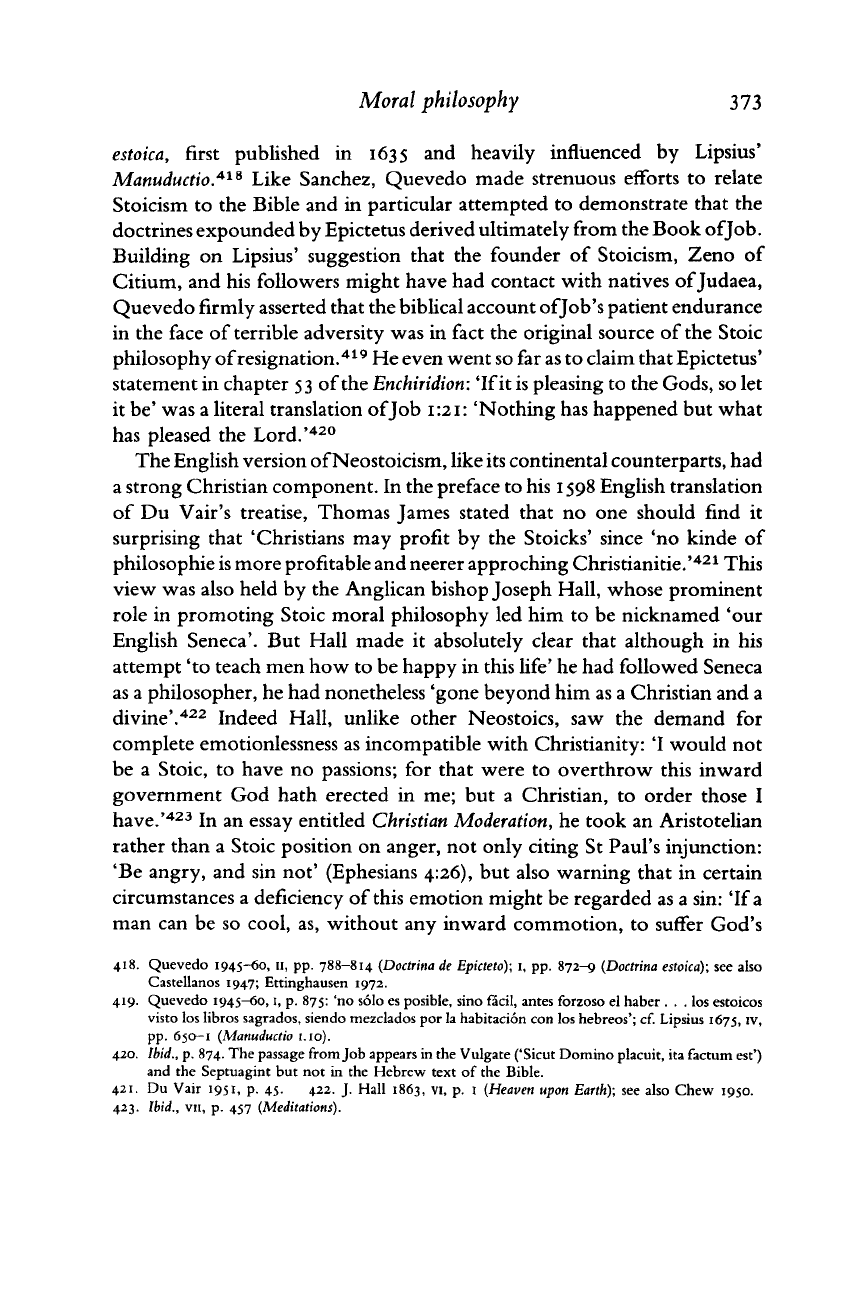
Moral
philosophy
373
estoica,
first published in 1635 and heavily influenced by Lipsius'
Manuductio.
A1%
Like
Sanchez, Quevedo made strenuous efforts to relate
Stoicism to the Bible and in particular attempted to demonstrate that the
doctrines expounded by Epictetus derived ultimately from the Book of
Job.
Building
on Lipsius' suggestion that the founder of Stoicism, Zeno of
Citium,
and his followers might have had contact with natives of
Judaea,
Quevedo
firmly asserted that the biblical account of Job's patient endurance
in the face of terrible adversity was in fact the original source of the Stoic
philosophy of resignation.
419
He even went so far as to claim that Epictetus*
statement in chapter 53 of the
Enchiridion:
'If
it is pleasing to the
Gods,
so let
it be' was a literal translation of Job
1:21:
'Nothing has happened but what
has pleased the
Lord.'
420
The
English version of Neostoicism, like its continental counterparts, had
a strong Christian component. In the preface to his 1598 English translation
of Du Vair's treatise, Thomas James stated that no one should find it
surprising that 'Christians may profit by the Stoicks'
since
'no kinde of
philosophic is more profitable and neerer approching Christianitie.'
421
This
view was also held by the Anglican bishop Joseph Hall, whose prominent
role in promoting Stoic moral philosophy led him to be nicknamed 'our
English
Seneca'. But Hall made it absolutely clear that although in his
attempt 'to teach men how to be happy in this life' he had followed Seneca
as a philosopher, he had
nonetheless
'gone beyond him as a Christian and a
divine'.
422
Indeed Hall, unlike other Neostoics, saw the demand for
complete
emotionlessness
as incompatible with Christianity: 'I would not
be a Stoic, to have no passions; for that were to overthrow this inward
government God hath erected in me; but a Christian, to order
those
I
have.'
423
In an essay entitled
Christian
Moderation,
he took an Aristotelian
rather than a Stoic position on anger, not only citing St Paul's injunction:
'Be
angry, and sin not' (Ephesians
4:26),
but also warning that in certain
circumstances a deficiency of this emotion might be regarded as a sin: 'If
a
man can be so cool, as, without any inward commotion, to surfer God's
418.
Quevedo
1945-60, 11, pp. 788-814
{Doctrina
de
Epicteto);
1, pp. 872-9
(Doctrina
estoica);
see
also
Castellanos
1947;
Ettinghausen
1972.
419.
Quevedo
1945-60,1, p. 875: 'no
sólo
es
posible,
sino
fácil,
antes
forzoso
el
haber
...
los
estoicos
visto
los
libros
sagrados,
siendo
mezclados
por la
habitación
con los
hebreos';
cf.
Lipsius
1675,
iv,
pp.
650-1
(Manuductio
1.10).
420.
Ibid.,
p. 874. The
passage
from
Job
appears
in the
Vulgate
('Sicut
Domino
placuit,
ita
factum
est')
and the
Septuagint
but not in the
Hebrew text
of the
Bible.
421.
Du
Vair
1951, p. 45. 422. J.
Hall
1863, vi, p.
1 (Heaven upon
Earth);
see
also
Chew
1950.
423.
Ibid., vil, p.
457
(Meditations).
Cambridge Histories Online © Cambridge University Press, 2008
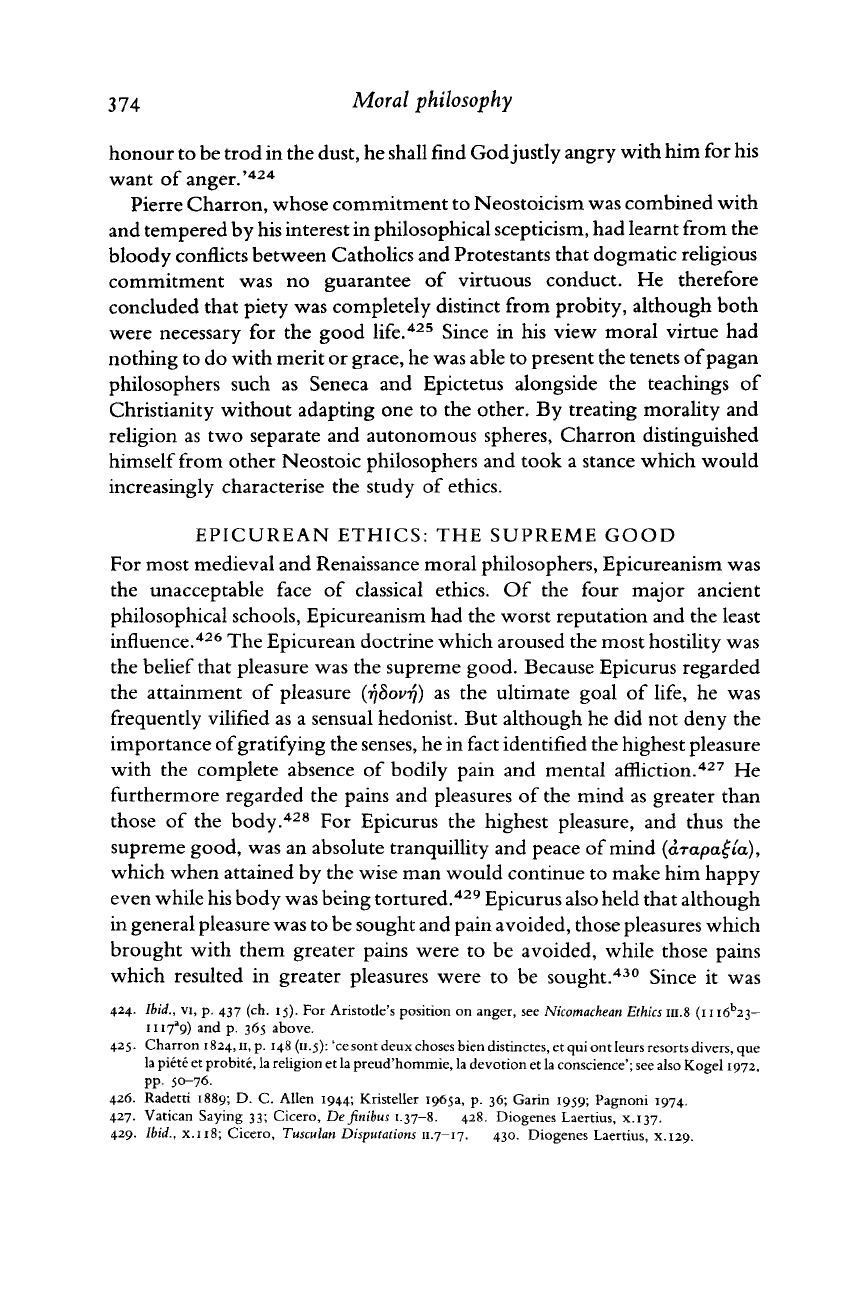
374
Moral
philosophy
honour to be trod in the dust, he shall find
God
justly
angry with him for his
want
of anger.'
424
Pierre
Charron,
whose commitment to Neostoicism was combined with
and tempered by his interest in philosophical scepticism, had learnt from the
bloody
conflicts between Catholics and Protestants that dogmatic religious
commitment was no guarantee of virtuous conduct. He therefore
concluded that piety was completely distinct from probity, although both
were necessary for the good life.
425
Since in his view moral virtue had
nothing to do with merit or grace, he was able to present the tenets of
pagan
philosophers such as Seneca and Epictetus alongside the teachings of
Christianity
without adapting one to the other. By treating morality and
religion as two separate and autonomous spheres,
Charron
distinguished
himself from other Neostoic philosophers and took a stance which would
increasingly characterise the study of ethics.
EPICUREAN
ETHICS:
THE
SUPREME
GOOD
For
most medieval and Renaissance moral philosophers, Epicureanism was
the unacceptable face of classical ethics. Of the four major ancient
philosophical schools, Epicureanism had the worst reputation and the least
influence.
426
The Epicurean doctrine which aroused the most hostility was
the belief that pleasure was the supreme good. Because Epicurus regarded
the attainment of pleasure
(rjSovrj)
as the ultimate goal of life, he was
frequently
vilified as a sensual hedonist. But although he did not deny the
importance of
gratifying
the
senses,
he in fact identified the highest pleasure
with the complete absence of bodily pain and mental affliction.
427
He
furthermore regarded the pains and pleasures of the mind as greater than
those
of the body.
428
For Epicurus the highest pleasure, and thus the
supreme good, was an absolute tranquillity and peace of mind (arapa£ia),
which when attained by the wise man would continue to make him happy
even while his body was being tortured.
429
Epicurus
also held that although
in general pleasure was to be sought and pain avoided,
those
pleasures which
brought
with them greater pains were to be avoided, while
those
pains
which resulted in greater pleasures were to be sought.
430
Since it was
424.
Ibid.,
vi, p. 437 (ch. 15). For Aristotle's position on anger, see
Nicomachean
Ethics
111.8
(in6
b
23-
ni7
a
9) and p. 365 above.
425.
Charron
1824,11,
p. 148
(11.5):
'ce sont deux
choses
bien distinctes, et qui ont leurs resorts divers, que
la
piété et probité, la religion et la preud'hommie, la devotion et la conscience'; see also
Kogel
1972,
pp.
50-76.
426. Radetti 1889; D. C. Allen 1944; Kristeller 1965a, p. 36;
Garin
1959; Pagnoni 1974.
427.
Vatican Saying 33;
Cicero,
De
Jinibus
1.37-8. 428. Diogenes Laertius,
x.137.
429.
Ibid.,
x.
118;
Cicero,
Tusculan
Disputations
11.7-17.
430. Diogenes Laertius, x. 129.
Cambridge Histories Online © Cambridge University Press, 2008
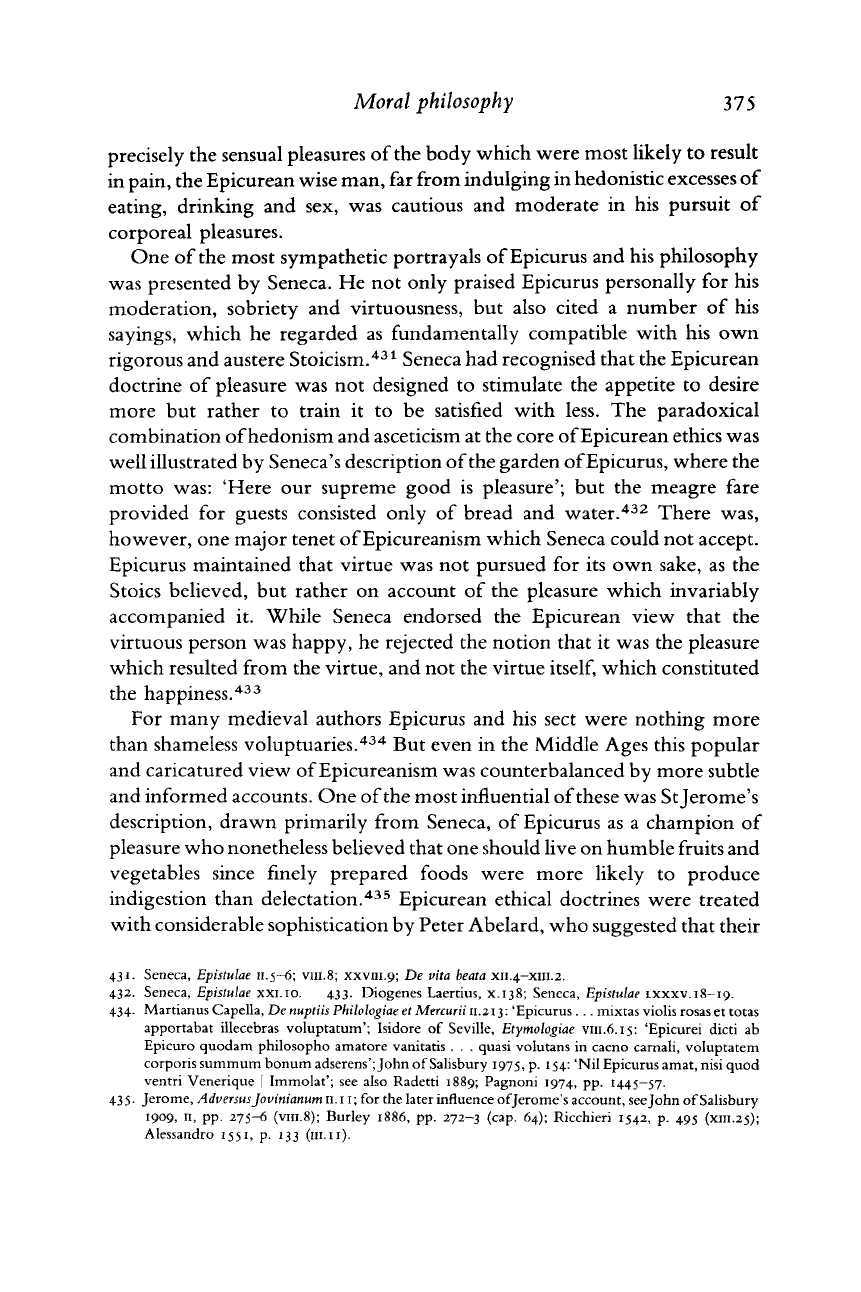
Moral philosophy
375
precisely
the
sensual pleasures
of
the body which were most
likely
to
result
in pain, the Epicurean wise man,
far
from indulging
in
hedonistic excesses of
eating, drinking
and sex, was
cautious
and
moderate
in his
pursuit
of
corporeal pleasures.
One
of
the most sympathetic portrayals
of
Epicurus
and his
philosophy
was
presented
by
Seneca.
He not
only praised Epicurus personally
for his
moderation, sobriety
and
virtuousness,
but
also cited
a
number
of his
sayings,
which
he
regarded
as
fundamentally compatible with
his own
rigorous
and
austere Stoicism.
431
Seneca
had
recognised
that
the
Epicurean
doctrine
of
pleasure
was not
designed
to
stimulate
the
appetite
to
desire
more
but
rather
to
train
it to be
satisfied with less.
The
paradoxical
combination
of
hedonism
and
asceticism
at the
core
of
Epicurean ethics was
well
illustrated
by
Seneca's description
of
the garden
of
Epicurus, where
the
motto
was:
'Here
our
supreme good
is
pleasure';
but the
meagre fare
provided
for
guests consisted only
of
bread
and
water.
432
There
was,
however,
one
major tenet
of
Epicureanism which Seneca could
not
accept.
Epicurus maintained
that
virtue
was not
pursued
for its own
sake,
as the
Stoics
believed,
but
rather
on
account
of the
pleasure which invariably
accompanied
it.
While Seneca endorsed
the
Epicurean
view
that
the
virtuous person
was
happy,
he
rejected
the
notion
that
it was the
pleasure
which
resulted from
the
virtue,
and not the
virtue itself, which constituted
the happiness.
433
For many medieval authors Epicurus
and his
sect were nothing more
than
shameless voluptuaries.
434
But
even
in the
Middle
Ages
this popular
and caricatured
view
of
Epicureanism was counterbalanced
by
more subtle
and informed accounts. One
of
the most influential
of
these was
St
Jerome's
description, drawn primarily from Seneca,
of
Epicurus
as a
champion
of
pleasure who nonetheless believed
that
one should
live
on
humble fruits
and
vegetables
since finely prepared foods were more
likely
to
produce
indigestion
than
delectation.
435
Epicurean ethical doctrines were treated
with
considerable sophistication
by
Peter Abelard, who suggested
that
their
431.
Seneca,
Epistulae
n.5-6; vin.8; xxvm.9; De
vita
beata
XI1.4-XHI.2.
432. Seneca,
Epistulae
xxi.io. 433. Diogenes Laertius, x.138; Seneca,
Epistulae
LXXXV.
18-19.
434. Martianus Capella, De
nuptiis
Philologiae
et
Mercurii
11.213:
'Epicurus ... mixtas violis
rosas
et totas
apportabat
illecebras voluptatum'; Isidore of Seville,
Etymologiae
vm.6.15:
'Epicurei dicti ab
Epicuro
quodam philosopho amatore vanitatis . . . quasi volutans in caeno carnali, voluptatem
corporis summum bonum adserens'; John of Salisbury 1975, p. 154: 'Nil Epicurus amat,
nisi
quod
ventri Venerique | Immolat'; see
also
Radetti 1889; Pagnoni 1974, pp. 1445-57.
43 5. Jerome,
Adversus
Jovinianum
11.11;
for the later influence of Jerome's account, see John of Salisbury
1909, 11, pp. 275-6 (vin.8); Burley 1886, pp. 272-3 (cap. 64); Ricchieri 1542, p. 495 (xm.25);
Alessandro 1551, p. 133
(1n.11).
Cambridge Histories Online © Cambridge University Press, 2008
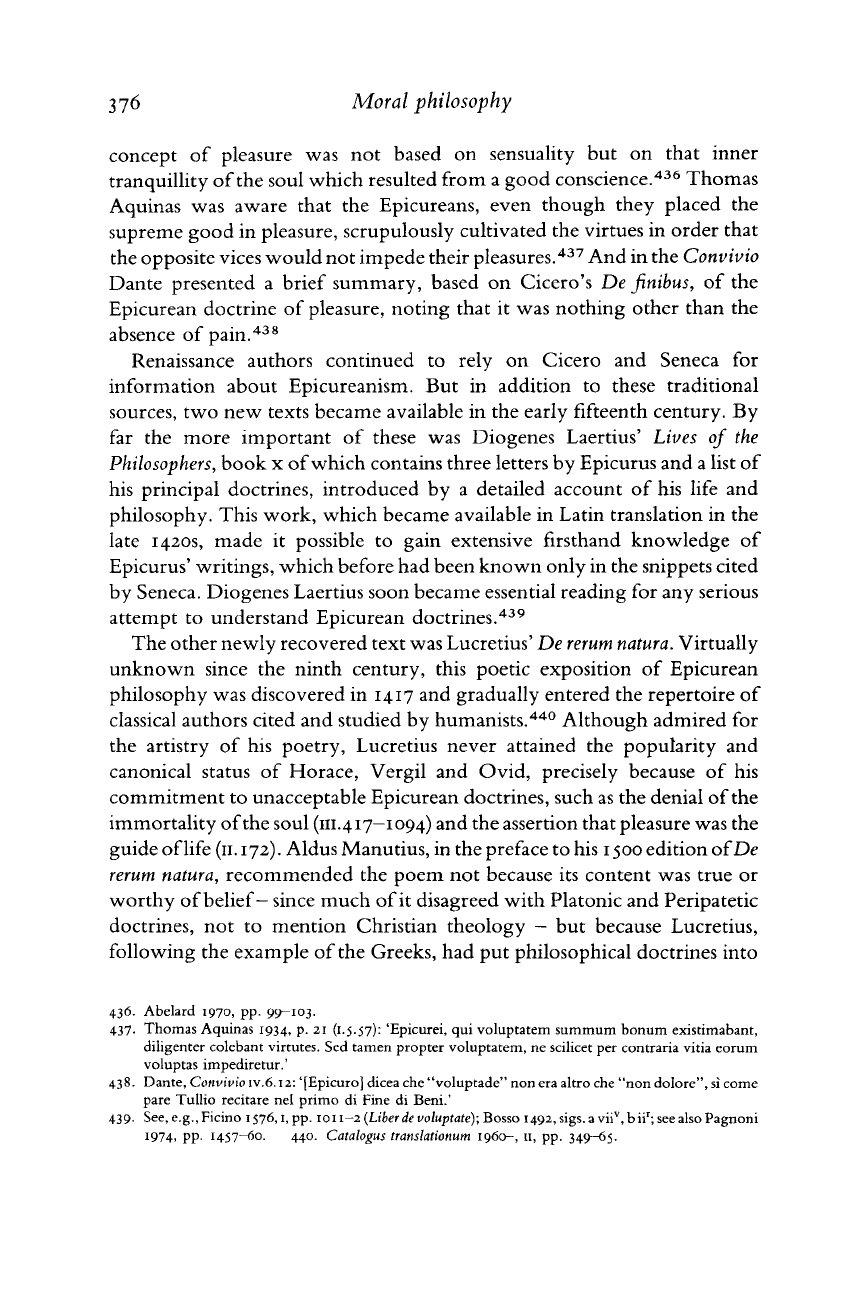
376
Moral philosophy
concept of pleasure was not based on sensuality but on
that
inner
tranquillity
of
the soul which resulted from a good conscience.
436
Thomas
Aquinas
was aware
that
the Epicureans, even though they placed the
supreme good in pleasure, scrupulously cultivated the virtues in order
that
the opposite
vices
would not impede their pleasures.
437
And in the Convivio
Dante presented a brief summary, based on Cicero's De finibus, of the
Epicurean doctrine of pleasure, noting
that
it was nothing other
than
the
absence of pain.
438
Renaissance authors continued to rely on
Cicero
and Seneca for
information about Epicureanism. But in addition to these traditional
sources, two new texts became available in the early fifteenth century. By
far the more important of these was Diogenes Laertius' Lives of the
Philosophers,
book x
of
which
contains
three
letters by Epicurus and a list of
his principal doctrines, introduced by a detailed account of his
life
and
philosophy. This work, which became available in Latin translation in the
late 1420s, made it possible to gain extensive firsthand knowledge of
Epicurus' writings, which before had been known only in the snippets cited
by
Seneca. Diogenes Laertius soon became essential reading for any serious
attempt to understand Epicurean doctrines.
439
The
other newly recovered text was Lucretius' De
rerum
natura.
Virtually
unknown since the
ninth
century, this poetic exposition of Epicurean
philosophy was discovered in 1417 and gradually entered the repertoire of
classical
authors cited and studied by humanists.
440
Although admired for
the artistry of his poetry, Lucretius never attained the popularity and
canonical status of Horace,
Vergil
and
Ovid,
precisely because of his
commitment to unacceptable Epicurean doctrines, such as the denial
of
the
immortality
of
the soul (m.417-1094) and the assertion
that
pleasure was the
guide
of
life
(11.172).
Aldus Manutius, in the preface to his 1500 edition ofDe
rerum
natura,
recommended the poem not because its content was
true
or
worthy
of
belief
—
since much
of
it disagreed with Platonic and Peripatetic
doctrines, not to mention Christian theology — but because Lucretius,
following
the example of the Greeks, had put philosophical doctrines into
436.
Abelard
1970, pp.
99-103.
437.
Thomas
Aquinas
1934, P- 21
(1.5.57):
'Epicurei,
qui
voluptatem
summum
bonum
existimabant,
diligenter
colebant
virtutes.
Sed
tarnen
propter
voluptatem,
ne
scilicet
per
contraria
vitia
eorum
voluptas
impediretur.'
438.
Dante,
Convivio
iv.6.12:
'[Epicuro]
dicea
che
"voluptade"
non era
altro
che "non
dolore",
sì
come
pare
Tullio
recitare
nel
primo
di
Fine
di
Beni.'
439. See, e.g.,
Ficino
1576,1, pp. 1011-2 (Liber de voluptate);
Bosso
1492,
sigs.
a
vii
v
,
b ii
r
; see
also
Pagnoni
1974, PP-
1
457~<fo-
440. Catalogus
translationum
i960—,
11, pp.
349—65.
Cambridge Histories Online © Cambridge University Press, 2008
